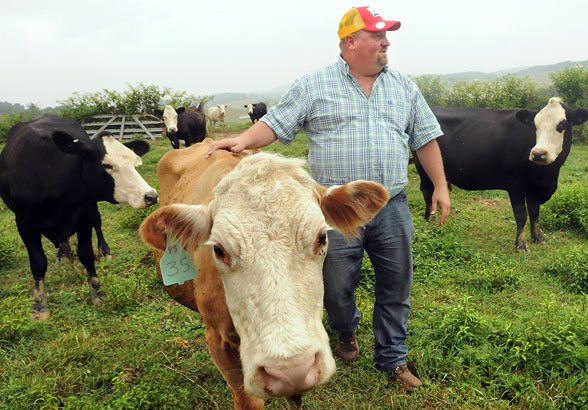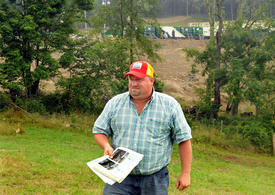|
This article originally provided by The Charleston Gazette July 23, 2011 Farmer: Gas driller has invaded property
FLEMINGTON, W.Va. -- Last March, Taylor County farmer Spencer Wooddell took 11 show horses to Ohio for breeding at an equine center. He never brought them back. The gas company EQT is drilling on his neighbor's land. Twice in the past eight months, workers have spilled fluids onto the farm -- and Wooddell is too scared to keep his prized mares at home. When you live next to a gas drilling operation, he said, "You don't have any control of your own property." West Virginia lawmakers are trying to develop regulations for Marcellus Shale drilling, which has boomed in West Virginia and other Appalachian states over the past few years. But Wooddell questions why the state didn't act sooner. "It's frustrating ... . Politically, it just doesn't seem to get anywhere," he said. "It just seems like the natural gas industry has the upper hand on the taxpayers now." EQT, a Pittsburgh-based company, says the spills weren't dangerous, but advocates for property owners say the incidents show that West Virginia needs stronger regulations. And Wooddell says the company simply hasn't respected his animals or his land.
"It's like total disregard," he said. The 44-year-old Wooddell and his wife, Tina, bought the rolling, 325-acre farm seven years ago. Late last year, EQT started hydro-fracturing, or "fracking," on their neighbor's land. In fracking, the operator pumps millions of gallons of water, mixed with sand and chemicals, into horizontal wells to fracture the shale formation. The Wooddells live about a mile and a half down the road, with their 8-year-old daughter and 4-year-old son. They planned to build a house on the farm. "We kinda put that on hold," he said, "to see what's happening with all this stuff." About 220 feet from the Wooddell property, men in hard hats work 24 hours a day, seven days a week, he said. The first spill happened Dec. 22, 2010. Woodell didn't find out for weeks, when one of his employees was checking on cattle and found a patch of land covered with lime. Workers apparently had spread the lime there after a spill, Wooddell said. EQT told the Wooddells the liquid was a mixture of concrete and detergent. They still don't know how much it was. The latest spill happened July 10, in a different area of the farm. This time, EQT called. It was about 1,700 gallons of water and fracking fluid. Wooddell says he never thought of himself as an environmentalist. He didn't try to conserve water or recycle plastic. Now, he's paying more attention to environmental issues. "You don't realize until it actually happens to you," he said. "This really opened my eyes." His wife owns a contracting business that lays water lines and does mine reclamation work. "I know energy's important," he said, "but at what cost?" Wooddell has paid for independent testing of his seven ponds, two streams and two springs. Testing results showed elevated levels of methane in some water sources. The methane is unrelated to the spills, Wooddell said. A Duke University study found high levels of leaked methane in well water near shale drilling and fracking sites in northeastern Pennsylvania and New York. The scientists found no evidence of fracking chemicals in the water. The Wooddells' situation shows how gas drilling impacts people beyond the land that companies lease, said Julie Archer of the West Virginia Surface Owners' Rights Organization. Drillers are only required to notify landowners and conduct pre-drilling tests for water wells and some springs within 1,000 feet of where a gas well enters the ground, but the horizontal legs of a well can stretch for a mile or more, Archer said. "[The Woodells] have affected water sources 2,400 feet from the well," Archer said, "so those aren't covered." The surface-owners organization wants the new regulations to extend the testing requirement and a well operator's liability for pollution or water loss from 1,000 feet to at least 2,500 feet or farther. Current state regulations do not require companies to alert property owners if there's a spill on their land, said state Department of Environmental Protection spokeswoman Kathy Cosco. The DEP is analyzing test results from the Wooddell property, said James Martin, head of the state Office of Oil and Natural Gas. EQT spokesman Kevin West said the fluids that spilled July 10 spill were a "very diluted" mixture of fresh water and fracking water. In initial soil testing, "there wasn't anything discovered, as far as chemicals or anything like that," West said. "We've taken corrective action with the contractor who was in charge of the operations," West said. "We won't be using them again on this particular site." West said it is company policy to notify landowners of any spills. The Wooddells have hired an attorney, although they haven't filed a lawsuit yet. Their lawyer, Sherri VanTassel, said EQT has shown "a lack of communication and just common courtesy." "I look at the Wooddells, and their dreams have been destroyed," VanTassel said. "There's no way that they're ever going to be comfortable at this point that their animals are going to be safe there." The issues go beyond the spills, she said. Cows have gotten stuck in pipe valves along the ground. Animals have escaped when contractors cut fences to survey part of the Wooddell property, where other people own rights to the minerals under the ground. One time, Wooddell got a call that about 45 of his black cows were wandering along a highway early one morning. Lawmakers this year tried to write new regulations for Marcellus development, but the House of Delegates and state Senate could not agree on many provisions. A new legislative committee is working on a compromise bill they could vote on during a possible special session later this year. Earlier this month, Senate President Earl Ray Tomblin, who is acting as governor, ordered the DEP to develop emergency environmental rules for Marcellus drilling. But citizens groups say those rules don't include protections for property owners. For now, Wooddell is counting on a couple of spy cams he sent up near his property lines. He wants to know if anything else spills or if contractors cut his fences again. "That's sad, isn't it, that you have to do those things?" he said. Reach Alison Knezevich at alis...@wvgazette.com or 304-348-1240.
|
|
|
West Virginia Surface Owners' Rights Organization |

